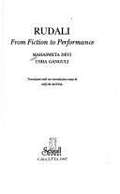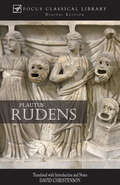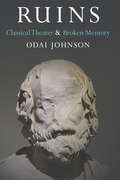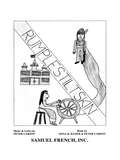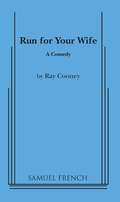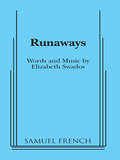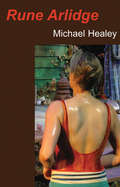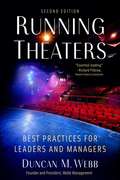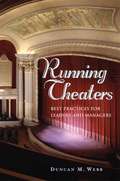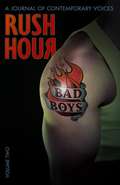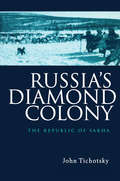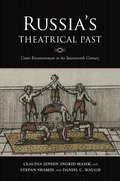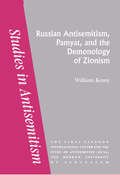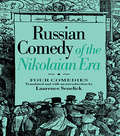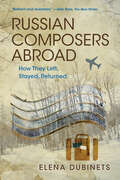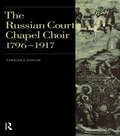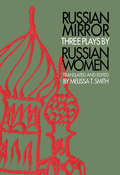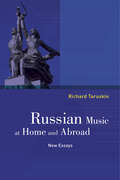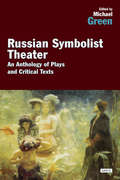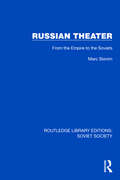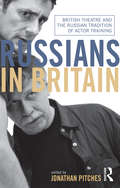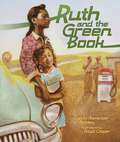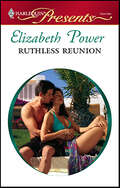- Table View
- List View
Rudali: From Fiction to Performance
by Anjum Katyal Mahasweta Devi Usha GanguliRudali means 'hired crier'. It is a Bengali short story by Mahasweta Devi. Also in this book is the Hindi play of the same name that is adapted from the short story by Usha Ganguli.
Rudens: The Rope
by David Christenson PlautusThe play Rudens provides an introduction to the world of Roman comedy from one of its best practitioners, Plautus. As with all Focus translations, the emphasis is on an inexpensive, readable edition that is close to the original, with an extensive introduction, notes and appendices.
Ruins: Classical Theater and Broken Memory (Theater: Theory/Text/Performance)
by Odai JohnsonTheorizing the effects of memory, absence, and disappearance in classical theater—the aesthetics of ruins.
Rumplestiltskin (Larson)
by Peter LarsonChildren's Musical / Flexible Cast / Unit Set / This humorous and enchanting musical brings the classic story to life with delightful songs, dancing, clever dialogue, and even some audience participation. The spirited songs by an awarding winning composer whose works have been recorded by Dionne Warwick and Bette Midler are provided with simple piano accompaniment. This musical is perfect for elementary school classes to perform or for children's theater groups, ages 6 12. Its an absolute charmer for parents or any audience. Cast size may be expanded to as many as 40 and the physical production may be simple or elaborate as conditions permit. Running time is approximately 30 minutes.
Run for Your Wife
by Ray CooneyFarce / 6m, 2f / Interior Set / This superb example of the British farce had them rolling in the aisles in London and New York. A taxi driver gets away with having two wives in different areas of London because of his irregular working schedule. Complication is piled upon complication as the cabby tries to keep his double life from exploding. For a side splitting sequel, see Caught in the Net .
Run, Hide, Fight Back
by April HenryWhen a deadly shooting breaks out in a Portland shopping mall, a diverse group of teens ends up trapped behind a store’s security shutter. To her own surprise, seventeen-year-old Miranda finds the others looking to her as their leader. But she’s hiding a big secret―and she’s not the only one. The group has only three choices: Run, hide, or fight back. The wrong decision will have fatal consequences. In her masterful style, April Henry crafts an unrelenting thriller with empowering teen heroes. For fans of the breakout YA mysteries This Is Where It Ends and One of Us Is Lying.
Runaways
by Elizabeth SwadosRunaways is a collection of songs sung by troubled children. While the subject is primarily runaway children from broken homes, Runaways also comments on the larger world in which the children live. / "Elizabeth Swados makes us eavesdrop on the sufferings of children. That sounds ominous but it isn't...The calligraphy of childhood is one of the wonders of nature even when the message it writes is heartbreaking." - The New York Times
Rune Arlidge
by Michael HealeyA family of women—the eldest incapable of keeping stories to herself, her two daughters on the verge of making life-altering decisions, a granddaughter wise beyond her years. Healey takes us on a 25-year-long trip to the family cottage. A new play by the author of The Drawer Boy.
Running Theaters, Second Edition: Best Practices for Leaders and Managers
by Duncan M. WebbAdvice Culled from Interviews with More Than One Hundred Experts in the Field In Running Theaters, management consultant and author Duncan M. Webb reveals the best practices that consistently lead to successful theater operations. Culled from surveys and interviews with theater managers and experts in crucial functional areas, this guide provides important tips for all people who work or want to work in regional, campus, and community-based theaters. Updated to reflect changes in the field, this second edition includes information on recent programming trends, marketing in the digital age, and the evolving role of theaters in economic and community development. Chapters discuss topics such as:Front- and back-of-house operationsManaging nonprofit and commercial rentersBuilding and managing a board of directorsThe financial management of theatersThe necessary skills and attributes of a successful theater managerThe unique opportunities and challenges of operating historic, outdoor, and campus-based theaters. Every theater manager needs this invaluable guide filled with the proven strategies of managers, staff, and volunteer leaders covering virtually every aspect of running a theater—from drawing audiences and fundraising to facility development and community involvement.
Running Theaters: Best Practices for Leaders and Managers
by Duncan M. WebbThe best practices that consistently lead to successful theater operation are now revealed in this comprehensive resource. Culled from surveys and interviews with theater managers and experts in crucial functional areas, this guide provides important tips for all people who work or want to work in regional, campus and community-based theaters. Proven strategies from managers, staff, and volunteer leaders cover virtually every aspect of running a theater - from audience development and fundraising to facility development and community involvement.
Rush Hour: Bad Boys (A Journal of Contemporary Voices Volume #2)
by Michael CartBold, innovative, and eclectic--that's Rush Hour,the place for thought-provoking stories, essays, art, and poems from today's most distinguished voices, both established and new. "Bad Boys" is the hard-hitting theme of Volume Two. Here are drifters, pranksters, jocks, rebels, monsters, and heroes living life on the edge. In knockout stories by Jackie Woodson and E. R. Frank, artwork by John O'Brien and Chris Gall, essays by Robert Lypsite and Jack Gantos, and much more, bad boys sometimes play by the rules, often misbehave, but always grab our attention. This second issue solidifies the reputation of this unprecedented, pulsating journal, published twice a year and focused on themes today's readers care about most. "Rush Hour is ... a vehicle for sharp, challenging new writing that aims for a discerning and literate young adult audience the way the best literary magazines have long done for older readers."
Russia's Diamond Colony: The Republic of Sakha
by John TichotskyThis study looks at the reform process in Sakha and at a one hundred year history of economic development. The research revealed that Sakha's progress has always been determined by the export of key resources.
Russia's Theatrical Past: Court Entertainment in the Seventeenth Century (Russian Music Studies)
by Claudia R. Jensen Ingrid Maier Stepan Shamin Daniel C. WaughIn the 17th century, only Moscow's elite had access to the magical, vibrant world of the theater.In Russia's Theatrical Past, Claudia Jensen, Ingrid Maier, Stepan Shamin, and Daniel C. Waugh mine Russian and Western archival sources to document the history of these productions as they developed at the court of the Russian tsar. Using such sources as European newspapers, diplomats' reports, foreign travel accounts, witness accounts, and payment records, they also uncover unique aspects of local culture and politics of the time. Focusing on Northern European theatrical traditions, the authors explore the concept of intertheater, which describes transmissions between performing traditions, and reveal how the Muscovite court's interest in theater and other musical entertainment was strongly influenced by diplomatic contacts.Russia's Theatrical Past, made possible by an international research collaborative, offers fresh insight into how and why Russians went to such great efforts to rapidly develop court theater in the 17th century.
Russian Antisemitism Pamyat/De (Studies In Antisemitism Ser. #Vol. 2.)
by CoreyFirst Published in 1995. Routledge is an imprint of Taylor & Francis, an informa company.
Russian Comedy of the Nikolaian Rea (Russian Theatre Archive Ser.)
by Laurence SenelickThese four Russian comedies were written during the reign of Nicholas I, a period of considerable repression and censorship. They represent the most popular genres of the period. Lensky's Her First Night was an immensely popular vaudeville which held the stage for years; Kozma Prutkov's Fantasy is a parody of vaudeville which was banned after one night. Turgenev's Luncheon with the Marshal is a comedy of manners about provincial life, and Saltykov-Schedrin's Pazukhin's Death is a satire of greed and corruption so savage that it was forbidden during the author's lifetime. This collection constitutes a remarkable comic spectrum which will assist in enlarging the English language repertoire with a set of newly available and hightly stageworthy scripts.
Russian Composers Abroad: How They Left, Stayed, Returned (Russian Music Studies)
by Elena DubinetsAs waves of composers migrated from Russia in the 20th century, they grappled with the complex struggle between their own traditions and those of their adopted homes. Russian Composers Abroad explores the self-identity of these émigrés, especially those who left from the 1970s on, and how aspects of their diasporic identities played out in their music. Elena Dubinets provides a journey through the complexities of identity formation and cultural production under globalization and migration, elucidating sociological perspectives of the post-Soviet world that have caused changes in composers' outlooks, strategies, and rankings. Russian Composers Abroad is an illuminating study of creative ideas that are often shaped by the exigencies of financing and advancement rather than just by the vision of the creators and the demands of the public.
Russian Court Chapel Choir: 1796-1917 (Music Archive Publications)
by Carolyn C. DunlopFirst Published in 2000. Routledge is an imprint of Taylor & Francis, an informa company.
Russian Culture and Theatrical Performance in America, 1891–1933
by Valleri J. HohmanBetween the 1890s and the 1930s, advancements in communication and travel encouraged widespread international cultural exchange, and Americans increasingly came into contact with Russian culture and theatrical performance. A number of factors, including emigration from Russia, world war, revolutionary activities in both Russia and the United States, and developments in modernism in the American theatre influenced the way those performances were received by American artists and audiences. Examining the work of impresarios, financiers, and the press as well as the artists themselves, Hohman demonstrates how a variety of Russian theatrical styles were introduced and incorporated into American theatre and dance.
Russian Mirror: Three Plays by Russian Women (Russian Theatre Archive Ser. #Vol. 14.)
by Melissa T. SmithThe three playwrights presented together in this volume On the Road to Ourselves), Elena Gremina (Behind the Mirror) and Olga Mikhailova (Russian Dream). The selected plays contain many elements which will appeal to Western directors and audiences: well-drawn characters, engaging plots, lively wit. Central to the three plays selected in this volume is a complex interaction of Russian and Western value systems, a theme that becomes increasingly relevant for Russian audiences with each passing season and no less relevant for Europeans and Americans.
Russian Music at Home and Abroad: New Essays
by Richard TaruskinThis new collection views Russian music through the Greek triad of "the Good, the True, and the Beautiful" to investigate how the idea of "nation" embeds itself in the public discourse about music and other arts with results at times invigorating, at times corrupting. In our divided, post–Cold War, and now post–9/11 world, Russian music, formerly a quiet corner on the margins of musicology, has become a site of noisy contention. Richard Taruskin assesses the political and cultural stakes that attach to it in the era of Pussy Riot and renewed international tensions, before turning to individual cases from the nineteenth century to the present. Much of the volume is devoted to the resolutely cosmopolitan but inveterately Russian Igor Stravinsky, one of the major forces in the music of the twentieth century and subject of particular interest to composers and music theorists all over the world. Taruskin here revisits him for the first time since the 1990s, when everything changed for Russia and its cultural products. Other essays are devoted to the cultural and social policies of the Soviet Union and their effect on the music produced there as those policies swung away from Communist internationalism to traditional Russian nationalism; to the musicians of the Russian postrevolutionary diaspora; and to the tension between the compelling artistic quality of works such as Stravinsky’s Sacre du Printemps or Prokofieff’s Zdravitsa and the antihumanistic or totalitarian messages they convey. Russian Music at Home and Abroad addresses these concerns in a personal and critical way, characteristically demonstrating Taruskin’s authority and ability to bring living history out of the shadows.
Russian Symbolist Theater: An Anthology of Plays and Critical Texts
by Michael GreenThis one-of-a-kind volume, superbly edited and translated by Michael Green, presents the most important works of the Russian Symbolist theatre--both plays and critical essays. <P><P> Although by writers better known for their verse and narrative prose, the plays of the Symbolists were not intended, like the dramatic poems of the Romantics, for the study rather than the stage. Instead, they are highly theatrical creations in a new style that demanded a new style of production. Meyerhold played a decisive role in the new Symbolist theatre and it was his production of Blok's The Puppet Show in Komissarzhevskaya's Theatre that launched the new direction in Russian drama.Among the works collected here are the plays The Puppet Show and The Rose and the Cross (Blok), The Triumph of Death (Sologub), The Comedy of Alexis and The Venetian Madcaps (Kuzmin), Thamyris Kitharodos (Annensky), and The Tragedy of Judas (Remizov) and essays by Briusov, Blok, Ivanov, Bely, Sologub, and Andreyev. Rounding out this essential anthology are Michael Green's general introduction, as well as insightful prefaces for each writer, placing the plays and essays into their cultural and historical contexts.
Russian Theater: From the Empire to the Soviets (Routledge Library Editions: Soviet Society)
by Marc SlonimRussian Theater (1963) is a comprehensive study of the main trends in Russian theatre in the nineteenth and twentieth centuries. Beginning with its origins in pagan folklore and ritual, it goes on to consider the romantic drama which flourished in the first half of the nineteenth century, the realistic drama of Gogol, Turgenev and their contemporaries, and the beginning of the modernist movement. The foundation of the famous Moscow Art Theatre in 1898 by Stanislavsky and Danchenko led to a remarkable period of innovation in acting, production and stage design which still influences the theatre of the West. Their association of Chekhov and their production of his plays is fully described. The reader is also introduced to the work of such playwrights as Andreyev and Gorky, and to the experiments and ideas of directors like Meeyerhold, Tairov and Vakhtangov. A large part of the book is devoted to a systemic analysis of plays and trends under the Soviets and the rise and fall of the avant-garde theatres and the reasons for their replacement by conservative realism.
Russians in Britain: British Theatre and the Russian Tradition of Actor Training
by Jonathan PitchesFrom Komisarjevsky in the 1920s, to Cheek by Jowl’s Russian ‘sister company’ almost a century later, Russian actor training has had a unique influence on modern British theatre. Russians in Britain, edited by Jonathan Pitches, is the first work of its type to identify a relationship between both countries’ theatrical traditions as continuous as it is complex. Unravelling new strands of transmission and translation linking the great Russian émigré practitioners to the second and third generation artists who responded to their ideas, Russians in Britain takes in: Komisarjevsky and the British theatre establishment. Stanislavsky in the British conservatoire. Meyerhold in the academy. Michael Chekhov in the private studio. Littlewood’s Theatre Workshop and the Northern Stage Ensemble. Katie Mitchell, Declan Donnellan and Michael Boyd. Charting a hitherto untold story with historical and contemporary implications, these nine essays present a compelling alternative history of theatrical practice in the UK.
Ruth and the Green Book
by Calvin A. RamseyRuth and the Green Book is the story of one black family's trip from Chicago to Alabama by car in the late 1940s. Along the way they encounter prejudice, but they also discover The Green Book, a real guide to accommodations which was published for decades to aid African-American travelers as they faced prejudice on the roads across the country.
Ruthless Reunion
by Elizabeth PowerOnly passion can unlock the secrets of the past…When handsome Alex Sabre recognizes her, Sanchia realizes that they must have once known each other intimately. But Sanchia has amnesia—her mind has rejected three years of painful memories. Sanchia knows that to unlock her secret past she must spend time with the rich and ruthless Alex….But Alex won't tell her what she needs to know—or why he's resisting the passionate sensual pull between them. What was he to her? What is he hiding? And what happens when Sanchia learns the truth about the man she's falling in love with...again?
